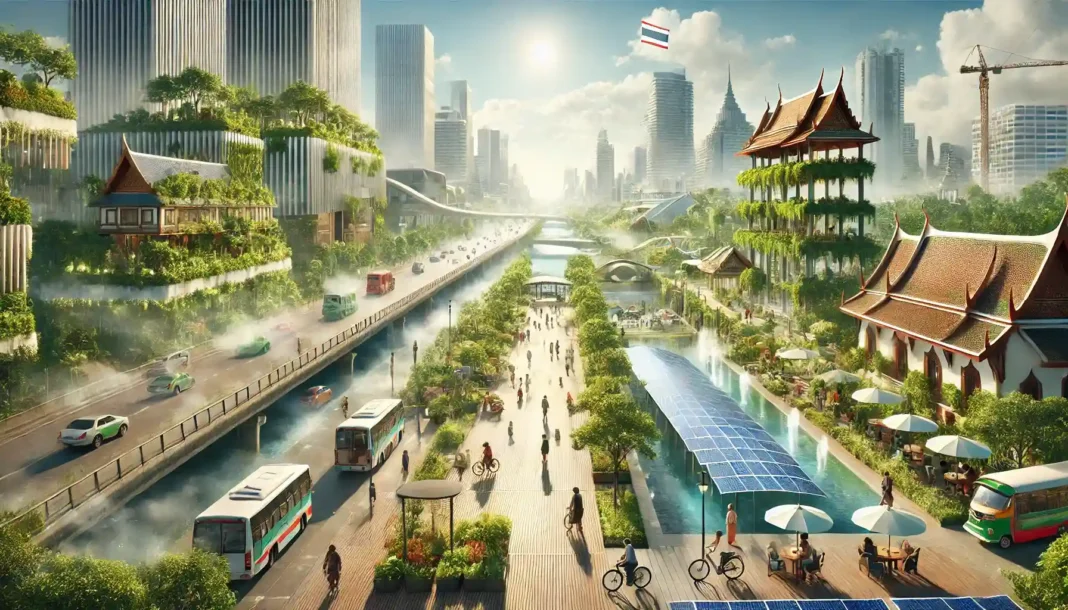As temperatures rise and urban areas grow, the initiative to cooling Bangkok has transitioned from a mere concept to an urgent requirement. With the city grappling with one of the most severe urban heat challenges globally, prompt measures are crucial.
The effects of climate change, coupled with swift urban development, have exerted significant strain on Thailand’s capital.
Fortunately, a recent report spearheaded by the World Bank presents a detailed strategy that has the potential to positively transform the city’s future.
An Urgent Heat Crisis
The struggle against escalating temperatures in Bangkok is not a future concern; it is a pressing reality faced daily. The phenomenon known as the “urban heat island” effect, driven by concrete buildings and sparse greenery, exacerbates the situation.
Additionally, the high population density in the city further intensifies the effects, rendering outdoor living increasingly challenging for its inhabitants.
The report indicates that this heat crisis transcends environmental concerns, constituting a public health emergency as well.
To combat this issue, the report advocates for a blend of immediate actions and long-term urban planning reforms.
These recommendations include the creation of additional green and blue spaces, the implementation of urban cooling systems, and the establishment of policies that support vulnerable populations.
Intelligent Urban Planning: A Framework for a Cooler Bangkok
A key feature of the initiative is its emphasis on intelligent urban planning. By utilizing comprehensive heat maps, municipal authorities can pinpoint the hottest areas and prioritize cooling interventions where they are most essential.
This evidence-based strategy guarantees that resources are allocated effectively, enhancing the efficacy of each initiative.
Natural Green and Blue Areas: Utilizing Nature as a Cooling Agent
Central to the initiative is an ambitious plan to expand green and blue areas. Parks, urban woodlands, rivers, and canals can significantly lower temperatures.
Trees not only offer shade but also release moisture into the atmosphere, creating more enjoyable neighborhoods.
Blue areas, such as rehabilitated canals and reservoirs, are equally important.
In addition to providing aesthetic and recreational benefits, they assist in stormwater management and cooling adjacent regions. Furthermore, these natural features can enhance air quality and biodiversity, fostering a healthier urban ecosystem overall.
Cooling Infrastructure: Where Innovation Meets Essential Needs
In conjunction with nature-based solutions, the proposal advocates for the installation of cutting-edge cooling infrastructure. This includes reflective rooftops, shaded pathways, and urban misting systems.
Such technologies are currently being piloted in cities around the globe and have demonstrated significant potential in lowering ambient temperatures.
If implemented judiciously in Bangkok, they could convert the city’s hottest areas into more comfortable environments.
Leadership and Inclusivity: Fundamental Elements of Advancement
Realizing such an ambitious vision necessitates robust leadership and active community involvement. Consequently, the report advocates for the appointment of a Chief Heat Officer.

This individual would be responsible for overseeing all initiatives related to cooling the city, facilitating coordination among various departments, and ensuring that progress is both steady and inclusive.
Public Engagement: Empowering Communities
Indeed, no urban development plan can thrive without the backing of the public. The World Bank underscores the significance of inclusive outreach, particularly to low-income neighborhoods, where residents are most susceptible to extreme heat.
Through educational campaigns and participatory planning, the city can guarantee that cooling initiatives benefit all citizens, not merely the affluent few.
Furthermore, by engaging local communities in tree planting, the upkeep of green spaces, and neighborhood enhancements, Bangkok can foster a sense of ownership and pride among its residents.
This, in turn, heightens the chances of achieving long-term success.
Challenges Ahead, but Also Hope
While the obstacles are considerable, Bangkok is not isolated in this struggle. Numerous cities worldwide are also grappling with extreme heat and have begun to implement similar successful strategies.
By drawing lessons from these cases and tailoring them to the local context, Bangkok can expedite its progress.
Additionally, the backing of international organizations such as the World Bank provides momentum and credibility to the city’s initiatives. Thus, the present moment is ideal for committing to transformative change.
Why the Time to Act is Now
Postponing action is no longer viable. Each year of inaction results in increased suffering for residents, escalating energy costs, and heightened health risks.
Conversely, taking proactive measures could yield both immediate and enduring advantages.
In addition to reducing temperatures, these initiatives could stimulate the economy, attract tourism, and improve the overall quality of life.
Therefore, a collaborative and strategic approach represents the most effective way forward. Through concerted efforts, Bangkok can pave the way for a cooler, more sustainable future.
Expert Editorial Comment
In summary, Cooling Bangkok represents not just a response to climate issues, but a visionary approach towards establishing a livable and resilient urban environment.
By integrating nature-based solutions, cutting-edge infrastructure, and inclusive governance, Bangkok has the potential to overcome its heat challenges.
The World Bank’s proposed roadmap provides specific, actionable measures that emphasize the well-being of both its citizens and the environment. Although obstacles persist, the dedication to fostering a cooler and healthier city has never been more pronounced.
This is the time for decisive action, cooperative leadership, and a collective promise to future generations. By adopting this vision now, Bangkok sets the foundation for a cooler and more sustainable future.

